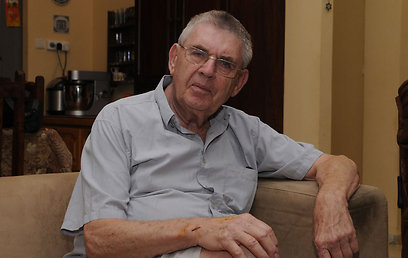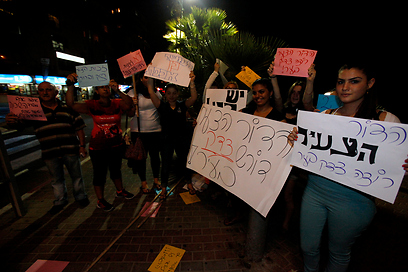
Foundation suspends Holocaust survivors' benefits
Foundation for the Benefit of Holocaust Victims in Israel fails to reimburse elderly beneficiaries for medical services, blames government for limited budget
The Foundation for the Benefit of Holocaust Victims in Israel has suspended the transfer of funds to over 8,000 survivors eligible for benefits, Ynet has learned.
The frozen funds were meant to reimburse survivors for medical bills of up to NIS 4,000 (roughly $1,000), which they have already paid out of pocket. To be eligible for the benefits, the survivors' monthly income must not exceed NIS 8,158 ($2,100). Some of the services and equipment covered include dental, hearing aides and prescription glasses.
Related stories:
- Over 25% of Holocaust survivors live in poverty
- Holocaust assets waiting for rightful heirs
- Posters seized by Nazis to be sold
Later this week the foundation will stop receiving applications for reimbursement until next year, citing an overflow of requests. The group has been receiving 100-150 such requests every day this year, but has so far paid out only NIS 30 million ($7.7 million) to 9,100 applicants.
Some 6,000 additional applicants whose requests have already been approved won't be reimbursed this year due to a budget shortage of NIS 20 million ($5.1 million). At least 2,000 others won't be able to file for reimbursement due to the abrupt deadline.

Zeev Abas (Photo: Avihu Shapira)
"Our state makes many promises and that's all very well, but those promises are not based in reality," said Zeev Abas, one of the Holocaust survivors who are being shorted by the foundation this year. "They don’t care about us."
Abas, 77, a resident of Kibbutz Hanita, was separated from his parents when he was five and survived War World II by hiding in a farm in the Netherlands. He filed a request for reimbursement back in May, for a hearing aid that cost him NIS 4,000 ($1,000). He has yet to be paid, with officials at the foundation insisting that they are awaiting funds from the Finance Ministry.
"I was counting on that money but had to go into an overdraft," he said. "In other countries they respect Holocaust survivors."
'Government's to blame'
The Foundation for the Benefit of Holocaust Victims was founded in the 1990s by survivors and is funded by the Finance Ministry, which covers 30% of its budget, the Claims Conference (60%) and other donors (10%). The organization's budget stood at NIS 440 million ($112.5 million) this year, of which NIS 370 million ($94.6 million) were allocated towards nursing services for the survivors.
The Finance Ministry said on Wednesday that the state aid budget for Holocaust survivors has grown from NIS 30 million ($7.7 million) in 2007 to NIS 210 million ($53.7 million) this year. The foundation, however, operates independently of the state, the Treasury said.

Protesters seek benefits for survivors (Archive photo: Amir Levy)
Rony Kalinsky, the foundation's general manager, placed the blame for the budget shortage on the government.
"This problem wasn't caused by the foundation, but by the government of Israel, which on the one hand says that it cares for the survivors, but on the other hand fails to allocate a budget," he said.
"The only reason the foundation was forced to temporarily shut down the flow of grants on such a short notice is that the state failed to allocate additional resources for the survivors of the Holocaust," he added.
- Receive Ynetnews updates directly to your desktop










